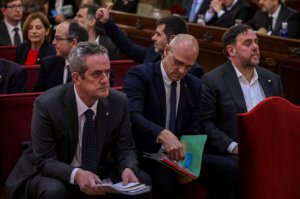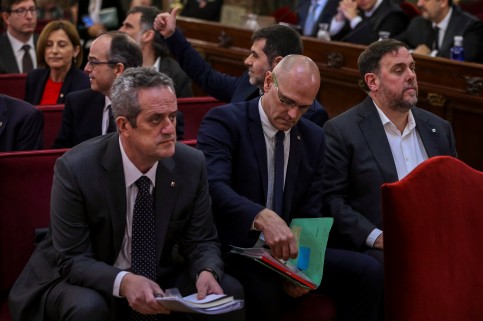‘I see myself as a political prisoner,’ was how the jailed former Catalan vice president Oriol Junqueras began his testimony in the Supreme Court on Thursday, day three of the trial.
‘I’m convinced that I’m being accused for my ideas and not for my actions,’ he added, as the trial of Catalan independence leaders continued in Madrid.
Oriol Junqueras also refused to answer any questions from the prosecutors.
‘I am being prosecuted for my ideas and not for my actions … I will not answer questions from the accusers.’
The third day of the trial of 12 politicians and activists charged over the 2017 independence bid came after defence teams and prosecutors laid out their arguments on the two previous days.
ALSO READ: Catalan Trial: Day 2 summary
Oriol Junqueras is the most senior political figure to face trial in the Supreme Court. He was the Catalan vice president and the finance minister at the time of the referendum, as well as the main independence leader along with then-president Carles Puigdemont.
While Puigdemont left the country following Madrid’s takeover of Catalan institutions, Junqueras stayed and was subsequently incarcerated on 2 November 2017 and has so far spent 469 days in custody.
ALSO READ: Catalan Trial focus: ‘It’s Oriol Junqueras’s moment’
In his testimony on Thursday, Junqueras remained defiant about organising the independence referendum on 1 October 2017, which was declared illegal by the Spanish judiciary.
‘The right to self-determination has been applied on countless numbers of occasions, we will continue trying regardless of what happens here,’ said the former vice president.

One of the most serious charges levelled at the leaders behind the independence bid is that they used violence to achieve their political goals. Yet, Junqueras forcefully denied the accusation: ‘Never, never, never. We’ve always rejected violence,’ he said, adding that ‘a noble political goal can become immoral if you use incorrect mechanisms to achieve it.’
The former vice president also rejected the accusation that organising the independence ballot can be considered an offence: ‘Nothing of what we did is a crime. Voting in a referendum is not a crime. Working for the independence of Catalonia is not a crime,’ he insisted.
Arguing that ‘this is not going to be solved by jailing people,’ Junqueras said ‘most Catalans agree: we need a political solution, which needs to be voted on, and the result must be respected.’
Junqueras also pointed to the refusal of the Spanish authorities to discuss the possibility of an agreed binding referendum on self-determination, saying ‘dialogue has always been denied. The chair opposite ours has always been empty.’
He also argued that the former government did nothing to hide its political objectives: ‘Any accusation that this was done with little transparency is not justified. Everything was public: the election manifestos, the parliamentary decisions, the votes … everything.’
At the end of his testimony, the former vice president added: ‘I love Spain, its people, language, and culture. How is this compatible with being a Catalan republican? The best way is to live together is to respect each other as equals.’
Junqueras is a practicing Catholic who speaks Spanish, Catalan, English and Italian.
A history professor at the Autonomous University of Barcelona, he also once did research at the Vatican.
He was elected a European lawmaker in 2009 and picked to head the pro-independence, left-wing Catalan ERC party in 2011.
Top members of the ERC came to Madrid to support Junqueras on his first day on the stand.
Joaquim Forn testimony
The former Catalan home affairs minister Joaquim Forn also testified in Spain’s Supreme Court on Thursday and said that he ‘defended the [independence] referendum as a politician, but told Catalan police to follow court orders.’
As the interior minister, Forn was in charge of Catalonia’s own police force, the Mossos d’Esquadra, during the independence referendum.
Accused of not doing enough to stop the vote, Forn denies giving any ‘political orders’ to the Catalan police and said the police body always followed court orders: ‘Nothing of what the Catalan police did on 20 September or 1 October was against the Spanish constitution.’
ALSO READ: Jailed Catalan leader to run for Barcelona mayor
Forn stressed that while Spanish police closed 106 police stations, Catalan police managed to block 297 polling places.
Forn spoke after former vice president Oriol Junqueras. Unlike Junqueras, Forn accepted responding questions by the public prosecutor and the solicitor general.
Yet the former home affairs minister, who has been in pre-trial jail ever since 2 November 2017, rejected questions from far-right Vox, which is the private prosecutor in the independence trial.
ALSO READ: Mariano Rajoy to be called as witness in Catalan trial
Government pursued dialogue ‘until last minute’
Asked about the declaration of independence on 27 October 2017, Forn said that the Catalan government pursued dialogue with Spain ‘until last minute’. Yet, he stressed that the declaration, passed by a majority of MPs in parliament, was never published in the Catalan government official gazette.
Along with Junqueras, Forn is the only minister who’s stayed behind bars consistently since 2 November 2017, when the Catalan government was incarcerated following a declaration of independence. Forn has spent 469 days in precautionary detention.
He is to run for Barcelona mayor as JxCat’s candidate.
The trial of the 12 Catalan independence leaders will resume on Tuesday 19 February,.
Catalan Trial: click here full details of those accused, the charges, and the accusers.
Click here for all articles and updates on the Catalan Trial
ALSO READ: Catalan Trial: Day 1 summary
ALSO READ: Catalan Trial: Day 2 summary


